Venice entry fee tickets go on sale. Here’s how they work
Editor’s Note: Sign up to CNN Travel’s Unlocking Italy newsletter for insider intel on Italy’s best loved destinations and lesser-known regions to plan your ultimate trip. Plus, we’ll get you in the mood before you go with movie suggestions, reading lists and recipes from Stanley Tucci.
Finally, the time has come: it’s time for Venice to charge for entry.
From April 25, the floating city began implementing the much discussed entry fee for day trippers.
The fee has been under discussion for years. Although it is expected to expand in scope, for 2024’s pilot run it will only be applied on certain days during the high season, between April 25 to July 14.
It’s not just day trippers who need to worry, though. Although people staying overnight in the city won’t have to pay the charge, if they’ll be in town on those dates, they will still need to register for an exemption.
So how do you register to pay the fee if you’re just coming for the day? And how do you register an exemption if you’re staying overnight? Here’s what to know.
When will the entry fee be in force?
The access fee will be due on 29 days between April 25 and July 14. The dates are as follows:
• April 25-30
• May 1-5
• May 11-12
• May 18-19
• May 25-26
• June 8-9
• June 15-16
• June 22-23
• June 29-30
• July 6-7
• July 13-14
The fee is charged for day visits between 8.30 a.m. and 4 p.m. For 2024, it’s a flat 5 euros ($5.45) per person per day.
For 2024, the city has exempted the fee for those traveling to most of the lagoon islands, including visitor hubs Murano and Burano, as well as the Lido, home to the city’s beaches. However, most visitors to Murano and Burano will have to pay the fee anyway, since most arrive by taking vaporetto ferries from the city center.
People transiting through Piazzale Roma (the bus terminus), Tronchetto or the Stazione Marittima (where small cruise ships still dock) will be exempt, as long as they don’t cross into the “Old City.” Cruise passengers must pay the fee to visit Venice, unless traveling to the airport, a spokesperson for the city told CNN.
How to pay if you’re a Venice day tripper
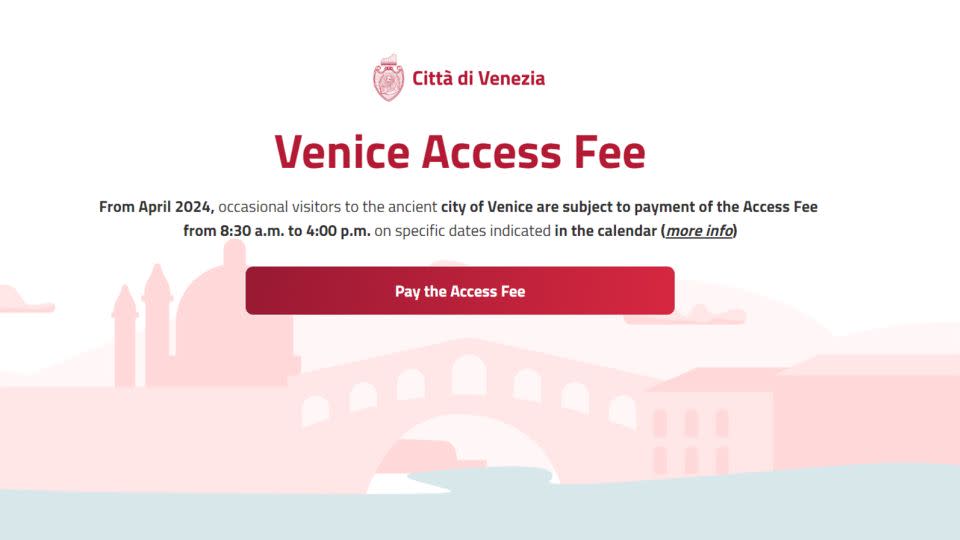
The Venice council has launched an online platform allowing you to prepay if you’re visiting for the day, here.
Click on pay the fee – you’ll then be taken to a landing page run by Venezia Unica, the city’s official tourism site.
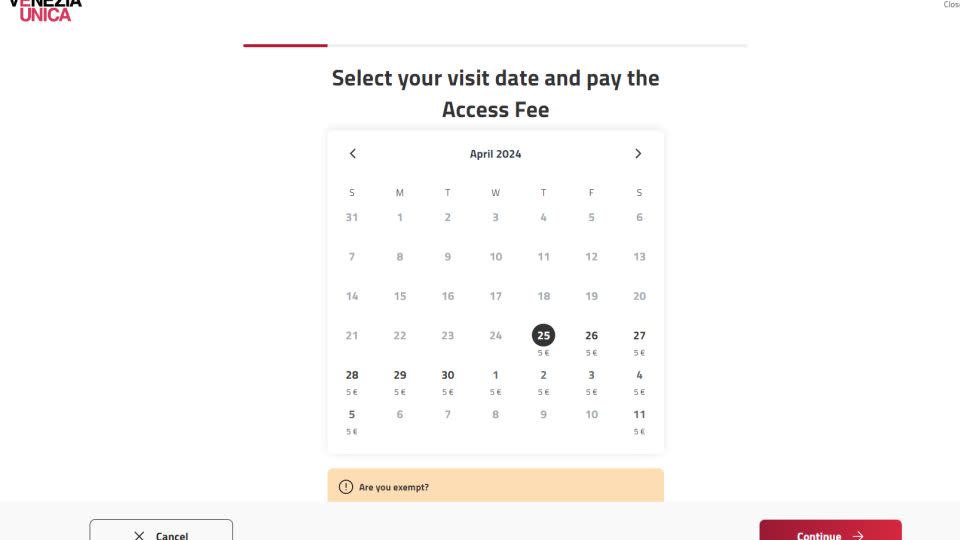
Select your date, and then the number of people, including children under 14 (who don’t pay – see below).
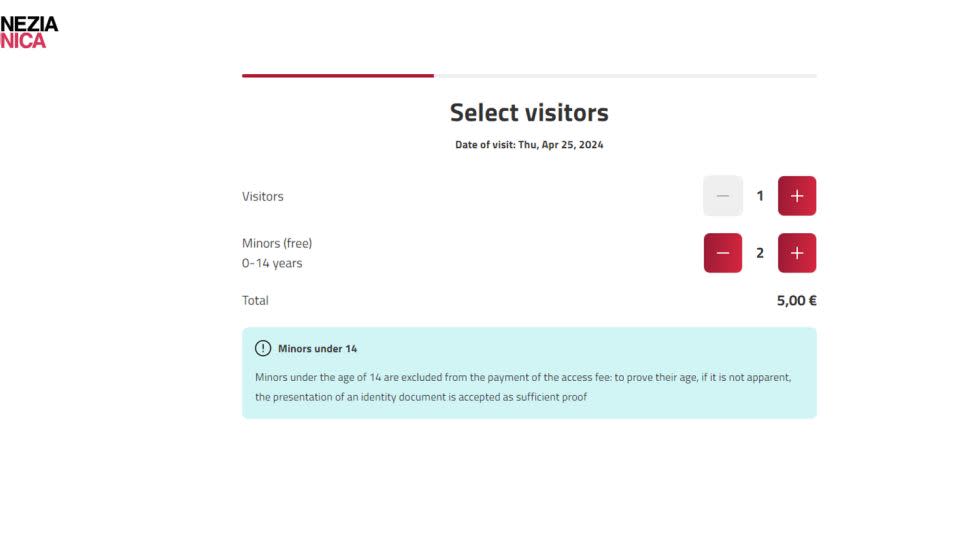
Enter the names of the adult travelers – in other words, those who need to pay the fee. You’ll then have 10 minutes to pay.
Fully paid up? You’ll be emailed an A4-sized document, listing your initials, your booking code, the day(s) you’ve booked and a QR code. You can print it off or show it on your phone when questioned.
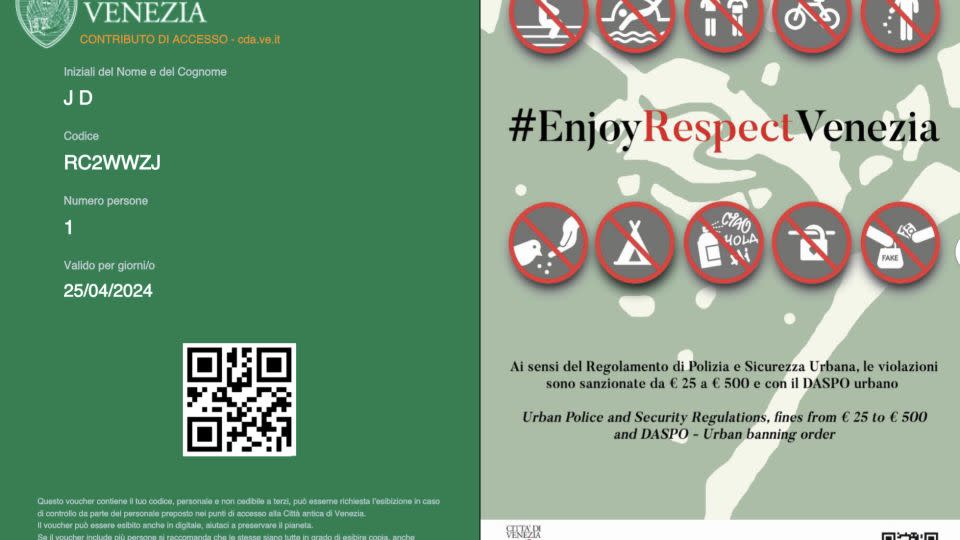
The “ticket” also advertises various city passes you can buy, and flags the fines payable for banned behaviors, such as picnicking and swimming in canals. Be aware that it’s written in Italian, even though the application can be done in English. Not to worry – the only details you need to check are your initials, the number in your party and the date (written European style, as in day-month-year).
The number of people does not include children – we applied for one adult and two under 14s, and our ticket showed one person.
All too complicated? In “exceptional” circumstances – the mayor of Venice used an example of an elderly person without a smartphone when talking to media on April 4 – you will also be able to pay on arrival at two entrance points: Piazzale Roma, the bus terminus, and the train station Venezia Santa Lucia. Expect there to be long lines, though.
If you want to cancel, you can do so up to 11.59 p.m. on the day before your booked visit.
Exemptions for people who are staying in Venice
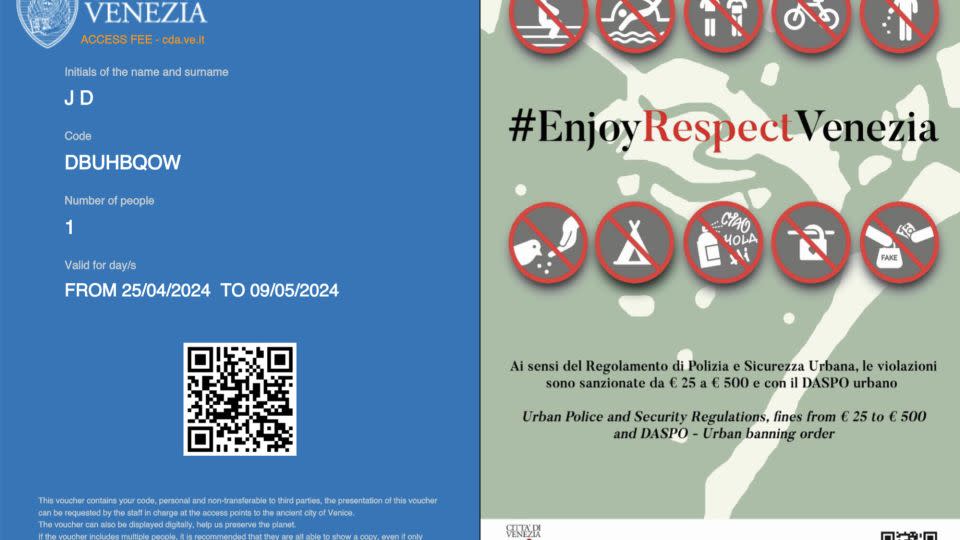
If you’re staying overnight in the city with a confirmed reservation, you don’t have to pay the charge, as you will already be paying an overnight tax.
However, you will still need to officially request an exemption, and receive a QR code to show if stopped. The exemption can be applied for on the same website – see below for instructions.
Other exemptions worth knowing about
There are various other exemptions, but they’re unlikely to be relevant for tourists. These include people who own property in the city (and pay property tax), and students and commuters working in Venice. They will have to register on the platform to obtain a long-term QR code valid for the year.
All other exemptions must obtain daily QR codes. These include:
• People visiting the city on business or short-term study.
• Tourists staying overnight in the wider Municipality of Venice, which includes Mestre on the mainland.
• People visiting residents of what is being dubbed the “Old Town” – the historic center of Venice.
• Children under 14.
• Visitors with “certified disabilities” and their carers.
• People visiting for a sporting event (such as the Venice Marathon) or for medical treatment.
There are other categories which are only really relevant to Italians,such as members of the armed forces visiting for work.
However, remember that anyone claiming an exemption (except residents and people born in Venice) must register for a QR code. Here’s how.
How to apply for an exemption
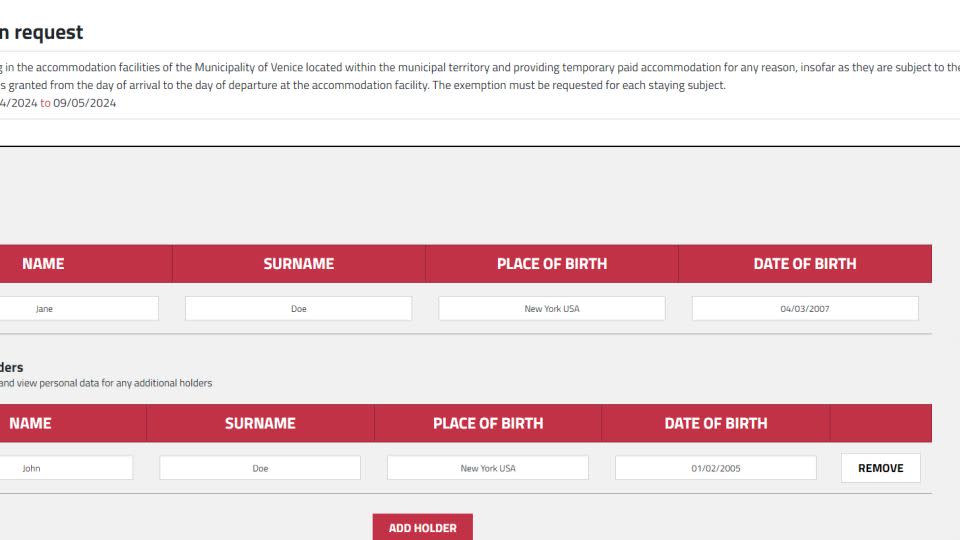
On the same platform, select “exemptions.” It’ll then take you through to this page.
If you’re a tourist, you’ll likely be applying because you’re staying overnight. So you’ll need to select “I am a guest of an accommodation facility located in the municipality of Venice.”
You’ll be covered from the day of arrival to the day of departure – in other words, you can arrive before you check in and hang around after you check out.
You can then enter the dates of your stay – you don’t need to request a daily pass.
Next you’ll enter your name, date and place of birth, “residence” (this means home address) plus email and phone number.
You then enter the name of where you’re staying. If it doesn’t pop up, you can enter it manually.
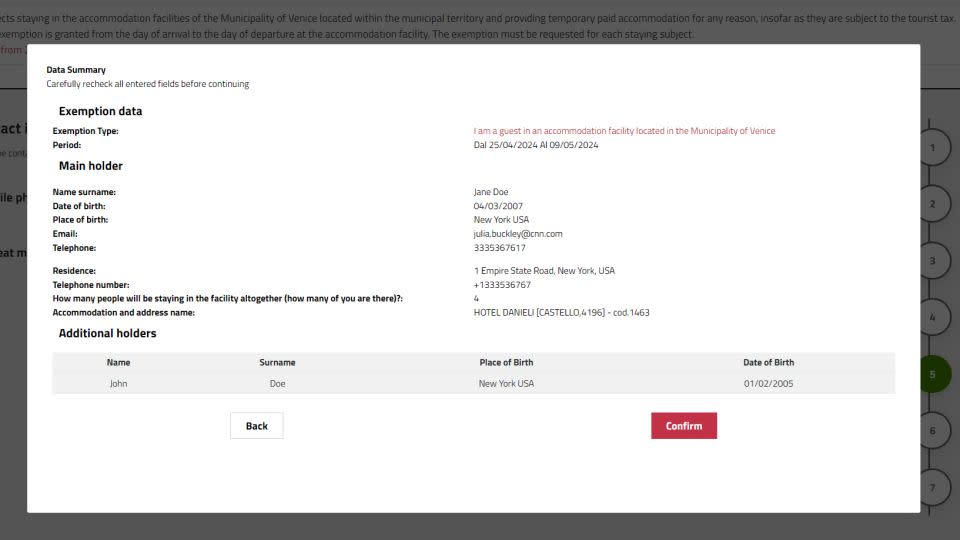
On the next page, you can enter the names of other people in your party – you don’t have to make a separate request for each.
Here’s where it gets more complicated. You’ll enter your phone number. Make sure it’s correct and can make international calls, because the next page will give you just 60 seconds to call a local number in Venice, which will verify your phone number.
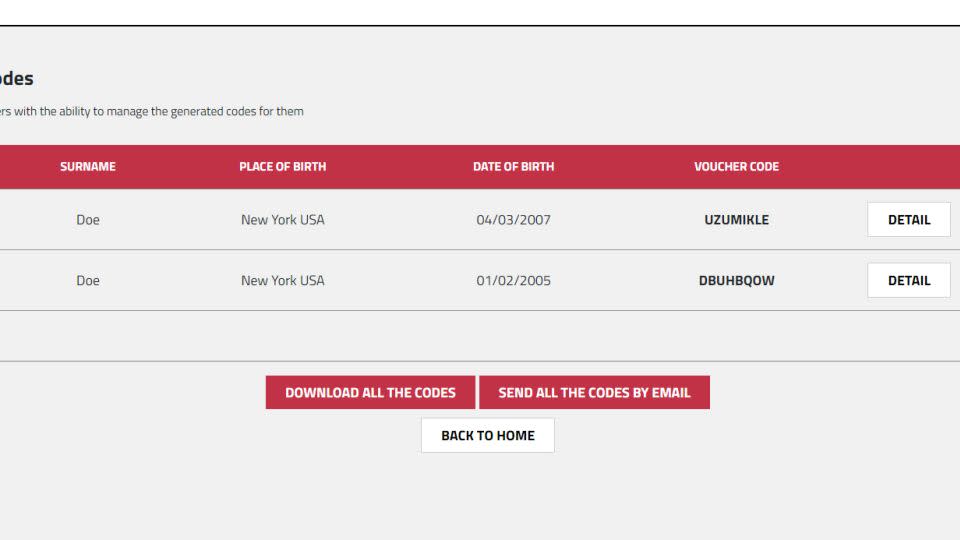
The call won’t connect, but it’ll confirm your number on the system, which will take you to the next page. Finally, your QR codes! You can download them direct, or have them emailed to you.
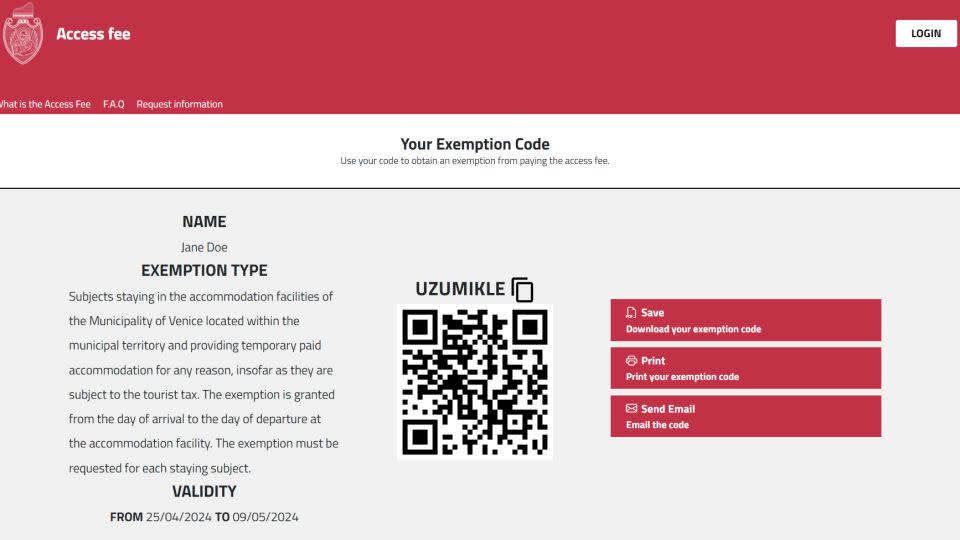
How will it be checked?
There will be seven main access points and ticket checks, including the airport, train and bus stations, Fusina port, and the Fondamente Nove and Riva degli Schiavoni waterfronts, where many boats dock. A spokesperson for the council confirmed that these won’t be the only checkpoints, but couldn’t say where the others would be.
Visitors to the city will have to line up to have their passes checked. Those claiming exemptions will undergo spot checks.
Adverts on trains and buses arriving in the city will flag people about the access fee. There are already posters in vaporetti (waterbuses) in Venice outlining the trial dates and how to book a ticket.
Penalties for not paying
Anyone caught evading payment – whether by not having a QR code, or by fabricating an exemption – will be fined. Penalties will range from 50-300 euros ($54-$327), plus an additional 10 euros to cover the entrance fee. Culprits can also be cited under the penal code for making false declarations.
What will happen after July?
This is a trial phase and the local authorities have not yet decided what to do afterwards. Expect it to depend on how these initial dates go.
Why is Venice charging?
The city is overwhelmed by tourists – around 30 million arrive each year, dwarfing the less-than 50,000 residents. Much of those numbers are day trippers who leave little money in the local economy, but plenty of trash and chaos.
The idea of charging a nominal fee is less about putting people off visiting, and more about raising awareness of peak season and busy days. Few people will abandon the idea of visiting Venice because of a five dollar charge, but they might be persuaded to wait for a less busy (and free) day to relieve the pressure on the city. In future years, the pressure to change dates might get a little stronger, since the plan is to implement a sliding scale of fees, depending on how busy the city is. However, the maximum fee that has been talked about is 10 euros – still not enough to dissuade anyone from visiting.
The city was also under pressure from UNESCO which had threatened to add Venice to its World Heritage in Danger list in 2023. The motion to do so was dropped after the city announced plans for the day tripper tax.
A felicitous knock-on effect could be curbing the spiraling number of illegal Airbnbs in the city. Since anyone staying overnight will need to list where they’re staying, people running illicit rentals will need to register legally (and pay tax on that income).
Will it work? Venice is the first major city in the world to try this, so let’s see.
For more CNN news and newsletters create an account at CNN.com


